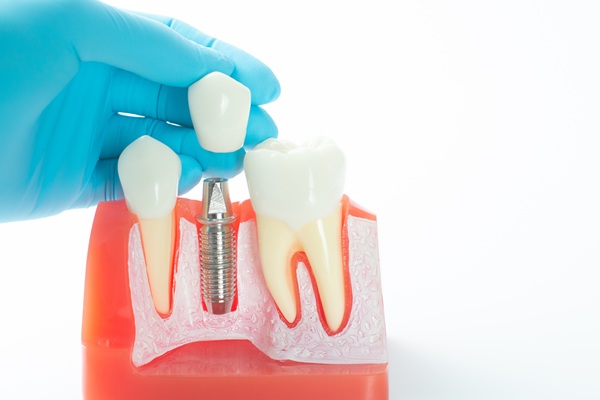Is Getting a Dental Implant and Crown Painful?

Many who need dental implant and crown procedures put off the treatment of out fear that the procedure will be painful.
Understanding what pain comes with the procedure can calm anxiety and allow those who are afraid to follow through with the treatment.
Pain from a Dental Implant and Crown
Dental implant and crown placement involves some pain and soreness. That said, it may not be to the extent or in the way you may think.
The following is everything to know about dental implant and crown treatment, including when and how the process is painful.
What is a dental implant and crown?
A dental implant is a small metal post that fuses to the jawbone. This allows dentists to mount a replacement tooth, such as a dental crown, onto the implant.
A dental implant most commonly serves to replace a missing tooth or many missing teeth. There are several reasons a dental implant may be necessary, including to ensure a crown or dental bridge sits properly in the mouth.
Although a dental implant does have a surgical component, the operation is safe and simple for most dentists to perform.
How is a dental implant and crown placed?
The first step in placing a dental implant is to remove any damaged teeth that are problematic and then clean the affected area, after which the dentist prepares the jawbone. In many instances, there is not much preparation that is needed, while in some other cases bone grafting may be necessary.
After the preparation is complete, the dental implant surgery occurs. In essence, the operation involves opening the gums and placing the dental implant into the jawbone. It may take several weeks to heal and for the dental implant to fuse with the jawbone. At this point, the abutment, such as a crown, is placed onto the dental implant.
Does dental implant and crown placement hurt?
Since most patients receive anesthesia for dental implant surgery, the surgical component is typically not painful at all. That said, there is likely to be discomfort following the operation. It is important to plan for several days away from work to ensure proper healing.
The pain or soreness following dental implant surgery generally lasts between up to 10 days. You can manage it with proper home care and pain medication. In the event the pain continues for more than two weeks, you should visit the dentist to ensure the healing process is going according to plan.
How to manage pain and soreness after treatment
The best way to cope with the pain and soreness after dental implant treatment is to take pain medication. Be sure to ask your dentist about what pain relief medication is the most effective.
Additionally, avoiding hot and cold beverages is always a good idea after dental implant placement. Be sure to practice good oral hygiene, which should include a consistent brushing schedule, flossing and using mouthwash every day as well as checking your mouth for any signs of oral health concerns.
Are you considering a dental implant in the Oakland area? Get more dental implant information at https://dentalimplantsoakland.com.
Recent Posts
Learning about the many benefits of dental implants is something everyone who is missing teeth needs to do before making a final tooth-replacement choice. The fact that there have been many improvements in the dental niche over recent years means that dental patients have more choices than ever before. Ready to learn more about this…
Before the invention of dental implants, the only options available to replace a lost tooth were dentures or bridges. Today, dental implants offer a solution that looks and feels like a natural tooth. They are attractive and comfortable, and they provide many advantages.If you are considering replacing a lost tooth with an implant, there are…
Dental implants are one of the options you get to choose from if you are missing one or more teeth. A growing number of people are opting for implants thanks to the convenience that comes with them and their bone tissue preserving properties. Dental implants are rods/screws that are inserted into the jawbone to serve…
Dental implants are highly recommended when it comes to replacing missing teeth. These oral prosthetics are surgically inserted into your jawbone, replacing the root that came out when you lost a tooth.Replacing lost teeth with dental implants requires minor oral surgery, and the implant is given up to six months to fuse with surrounding bone…


